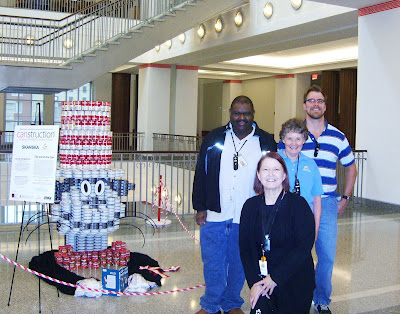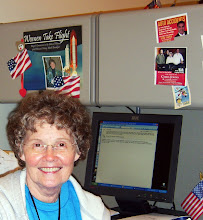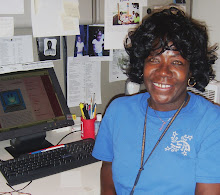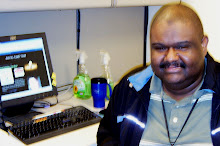Saturday, June 20, 2009
Thursday, June 11, 2009
Wednesday, June 10, 2009
Saturday, June 6, 2009
Monday, June 1, 2009
Thursday, May 28, 2009
Words

The finals of the US Spelling Bee competition are held in Washington tonight.
Last year's championship was won by 13 year-old Sameer Mishra from Lafayette in Indiana. Mishra, who won the trophy participating for the first time in the spelling bee competition, took home a cash prize of $35,000.
The word that Mishra spelled to finally win the competition was "guerdon," a term meaning 'something that one has earned or gained'.
And this year's winner is 13 year old Kavya Shivashankar who spelled 'laodicean', which means lukewarm or indifferent in religion or politics, to win the championship. Cool and collected, Kavya Shivashankar wrote out every word on her palm and always ended with a smile. She is taking home more than $40,000 in cash and prizes and, of course, the huge champion's trophy.
Monday, May 25, 2009
Tuesday, May 12, 2009
Employee of the Quarter
WolframAlpha
New Search Tool Aims at Answering Tough Queries, but Not at Taking on Google
By MIGUEL HELFT
Every new online search service must face the inevitable question: “Is it better than Google?”
WolframAlpha, a powerful new service that can answer a broad range of queries, has become one of the most anticipated Web products of the year. But its creator, Stephen Wolfram, wants to make something clear: Despite the online chatter comparing it to Google, his service is not intended to dethrone the king of search engines.
“I am not keen on the hype,” said Mr. Wolfram, a well-known scientist and entrepreneur and the founder of Wolfram Research, a company in Champaign, Ill., that has been quietly developing WolframAlpha.
Mr. Wolfram’s service does not search through Web pages, and it will not help with movie times or camera shopping. Instead it computes the answers to queries using enormous collections of data the company has amassed. It can quickly spit out facts like the average body mass index of a 40-year-old male, whether the Eiffel Tower is taller than Seattle’s Space Needle, and whether it is high tide in Miami right now.
WolframAlpha, which is expected to be available to the public at wolframalpha.com in the next week, is not a finished product. It is an early working version of a project that has been years in the making and will continue to evolve over years, if not decades. As such, there is much it cannot answer now.
But even as he dismisses the Google comparisons, Mr. Wolfram, a former child prodigy who published his first research paper on particle physics at age 15 and is best known for creating the math-formula software Mathematica, is happy to add fuel to the simmering expectations surrounding his service.
“I think WolframAlpha has the potential to be quite important,” he said.
The goal of creating a computer system that can answer questions has been a tantalizing but elusive pursuit for many computer scientists for more than four decades. Some veterans of the field say Mr. Wolfram may have come as close as anyone yet.
“In many ways, creating a system like this has been a holy grail of lots of folks for some time,” said Nathan Myhrvold, a former chief technology officer of Microsoft and co-founder of Intellectual Ventures, an investment company that owns a portfolio of patents.
“It has wound up being considered something that is virtually impossible,” Mr. Myhrvold said. WolframAlpha has shown “that it wasn’t impossible but really difficult,” he added. “It involved applying lots of different tricks.”
Doug Lenat, an artificial intelligence expert whose company Cycorp has spent the last 15 years developing a system that brings human-like reasoning to some computer systems, said WolframAlpha can handle “an astronomical number of questions,” and could eventually turn into a favorite destination on the Web.
“It may become a massive player alongside Google,” Mr. Lenat said.
Traditional search engines like Google and Yahoo, by and large, excel at finding information that already exists online. If there are Web pages that include the words used in a query, the engines will find them and rank them in order of relevance.
WolframAlpha is different. For starters, it does not gather data from the Web. Instead, its “knowledge base” is made up of reams and reams of data — ranging from the kinds of facts you would find in a World Almanac, to highly specialized data from physics and other sciences — that some 100 employees at Wolfram Research have gathered, verified and organized over several years.
When a user types in a query, WolframAlpha tries to determine the relevant area of knowledge and find the answers, often by performing calculations on its data. If you type “LDL 120,” it will return a graph showing the distribution of cholesterol levels among the United States population, and display the percentage of people above and below that figure. If you type “LDL 120 male 33,” it will adjust the results to focus on that gender and age group.
In response to “how far is the Moon from Earth,” WolframAlpha will calculate the exact distance based on an algorithm that computes the ever-changing distance between the two bodies. The engine that computes answers is largely built on Mathematica.
In its current state, there are many queries that WolframAlpha cannot answer, either because it does not understand the question or because it does not have the requisite data. For instance, it is stumped by queries like “obesity rate,” “housing prices New York” or “unemployment San Francisco” (but it will answer “unemployment San Francisco County”).
“It is going to be very good in some areas and incomplete in others,” said Nova Spivack, the chief executive of Radar Networks, which is using artificial intelligence and other techniques to help people find Web content that is interesting and relevant to them.
WolframAlpha does not actually try to work out the real meaning of a query, as some artificial intelligence systems do, so there are some questions it will never be able to answer. But experts say its approach appears to be effective in many areas.
“He’s done a great job of marrying the acquisition of data with the mathematical algorithms,” said David A. Ferrucci, an artificial intelligence researcher at I.B.M., who is leading a team developing a computer program that will compete with humans on “Jeopardy.”
If successful, WolframAlpha has the potential to become a large business opportunity. For now, Mr. Wolfram said he plans to offer advertising and other forms of sponsorship on the site, and perhaps offer premium versions of the service for researchers. And somewhat coyly, he said he has discussed potential partnerships with the “obvious people,” including search engine companies.
“We are actively pursuing interesting relationships,” he said.
Representatives for Google and Yahoo declined to discuss WolframAlpha.
Mr. Spivack and others said WolframAlpha may become a complement to traditional search engines, which themselves have begun to offer simple versions of the kinds of calculations and data manipulation at which WolframAlpha excels.
“There is a huge space of possible questions that Google doesn’t answer,” Mr. Spivack said. “I think WolframAlpha will go well beyond the academic world to cover business and industry, economics, health.”
By MIGUEL HELFT
Every new online search service must face the inevitable question: “Is it better than Google?”
WolframAlpha, a powerful new service that can answer a broad range of queries, has become one of the most anticipated Web products of the year. But its creator, Stephen Wolfram, wants to make something clear: Despite the online chatter comparing it to Google, his service is not intended to dethrone the king of search engines.
“I am not keen on the hype,” said Mr. Wolfram, a well-known scientist and entrepreneur and the founder of Wolfram Research, a company in Champaign, Ill., that has been quietly developing WolframAlpha.
Mr. Wolfram’s service does not search through Web pages, and it will not help with movie times or camera shopping. Instead it computes the answers to queries using enormous collections of data the company has amassed. It can quickly spit out facts like the average body mass index of a 40-year-old male, whether the Eiffel Tower is taller than Seattle’s Space Needle, and whether it is high tide in Miami right now.
WolframAlpha, which is expected to be available to the public at wolframalpha.com in the next week, is not a finished product. It is an early working version of a project that has been years in the making and will continue to evolve over years, if not decades. As such, there is much it cannot answer now.
But even as he dismisses the Google comparisons, Mr. Wolfram, a former child prodigy who published his first research paper on particle physics at age 15 and is best known for creating the math-formula software Mathematica, is happy to add fuel to the simmering expectations surrounding his service.
“I think WolframAlpha has the potential to be quite important,” he said.
The goal of creating a computer system that can answer questions has been a tantalizing but elusive pursuit for many computer scientists for more than four decades. Some veterans of the field say Mr. Wolfram may have come as close as anyone yet.
“In many ways, creating a system like this has been a holy grail of lots of folks for some time,” said Nathan Myhrvold, a former chief technology officer of Microsoft and co-founder of Intellectual Ventures, an investment company that owns a portfolio of patents.
“It has wound up being considered something that is virtually impossible,” Mr. Myhrvold said. WolframAlpha has shown “that it wasn’t impossible but really difficult,” he added. “It involved applying lots of different tricks.”
Doug Lenat, an artificial intelligence expert whose company Cycorp has spent the last 15 years developing a system that brings human-like reasoning to some computer systems, said WolframAlpha can handle “an astronomical number of questions,” and could eventually turn into a favorite destination on the Web.
“It may become a massive player alongside Google,” Mr. Lenat said.
Traditional search engines like Google and Yahoo, by and large, excel at finding information that already exists online. If there are Web pages that include the words used in a query, the engines will find them and rank them in order of relevance.
WolframAlpha is different. For starters, it does not gather data from the Web. Instead, its “knowledge base” is made up of reams and reams of data — ranging from the kinds of facts you would find in a World Almanac, to highly specialized data from physics and other sciences — that some 100 employees at Wolfram Research have gathered, verified and organized over several years.
When a user types in a query, WolframAlpha tries to determine the relevant area of knowledge and find the answers, often by performing calculations on its data. If you type “LDL 120,” it will return a graph showing the distribution of cholesterol levels among the United States population, and display the percentage of people above and below that figure. If you type “LDL 120 male 33,” it will adjust the results to focus on that gender and age group.
In response to “how far is the Moon from Earth,” WolframAlpha will calculate the exact distance based on an algorithm that computes the ever-changing distance between the two bodies. The engine that computes answers is largely built on Mathematica.
In its current state, there are many queries that WolframAlpha cannot answer, either because it does not understand the question or because it does not have the requisite data. For instance, it is stumped by queries like “obesity rate,” “housing prices New York” or “unemployment San Francisco” (but it will answer “unemployment San Francisco County”).
“It is going to be very good in some areas and incomplete in others,” said Nova Spivack, the chief executive of Radar Networks, which is using artificial intelligence and other techniques to help people find Web content that is interesting and relevant to them.
WolframAlpha does not actually try to work out the real meaning of a query, as some artificial intelligence systems do, so there are some questions it will never be able to answer. But experts say its approach appears to be effective in many areas.
“He’s done a great job of marrying the acquisition of data with the mathematical algorithms,” said David A. Ferrucci, an artificial intelligence researcher at I.B.M., who is leading a team developing a computer program that will compete with humans on “Jeopardy.”
If successful, WolframAlpha has the potential to become a large business opportunity. For now, Mr. Wolfram said he plans to offer advertising and other forms of sponsorship on the site, and perhaps offer premium versions of the service for researchers. And somewhat coyly, he said he has discussed potential partnerships with the “obvious people,” including search engine companies.
“We are actively pursuing interesting relationships,” he said.
Representatives for Google and Yahoo declined to discuss WolframAlpha.
Mr. Spivack and others said WolframAlpha may become a complement to traditional search engines, which themselves have begun to offer simple versions of the kinds of calculations and data manipulation at which WolframAlpha excels.
“There is a huge space of possible questions that Google doesn’t answer,” Mr. Spivack said. “I think WolframAlpha will go well beyond the academic world to cover business and industry, economics, health.”
Saturday, May 9, 2009
Tuesday, May 5, 2009
Friday, April 24, 2009
The Main Library is my ticket to extended family!
The year 2005 was probably the worst year of my life. It started out being exciting with the birth of my new grandson in January and when I went to help out my son’s family I fell and broke my right arm and left knee. My husband had to drive to Miami to retrieve me and it was during my recuperation I noticed how weak he was and could not help me at all. Here is where my library family came to my rescue. Jani French came and bathed me and washed my hair and also cut it even though she was scared to death to do it. My coworkers came all the way to Orange Park to cheer me up and after 2 months I came back to work only to have my husband in bad health. That summer when Main closed for preparation on the “Big Move”, I was allowed to stay at Main so I could visit my husband twice a day at either the hospital or nursing home. His passing in December closed the year. So many of my library extended family came to his service and I never would have gotten my life back together without them. When I retire I will miss the friends I have made here you are definitely my extended family.
Friday, April 17, 2009




« First Dog/Notes from the studio- “A Portuguese what…?”First Dog/Notes from the studio- “Workin’ like a dog!”
Tim Bowers' secret, super high-tech drying system
Because of the sprint to publication, these paintings were done at super-human speed. Instead of cutting corners on quality, I went into my 24 hours a day, seven days a week schedule (taking food and sometimes sleep breaks). My family is not too excited about the schedule but we make it work. The artwork was created with oil paints on canvas, which typically dry very slowly. I add a drying medium but still, it takes time. To speed up the drying process, I created a secret (until now), super, high-tech drying system to help finish the job. (It’s amazing what you can do with a hair dryer and some masking tape) -T.B.
Thursday, April 16, 2009
Wednesday, April 15, 2009
Tuesday, April 14, 2009
Monday, April 13, 2009
Monday, March 16, 2009
Seattle Post-Intelligencer to go Web only
 The iconic globe of the Seattle Post-Intelligencer is seen atop the company's waterfront headquarters near the Space Needle, in background. The 146-year-old paper prints its final edition Tuesday.
The iconic globe of the Seattle Post-Intelligencer is seen atop the company's waterfront headquarters near the Space Needle, in background. The 146-year-old paper prints its final edition Tuesday.Move leaves the Seattle Times as the only major daily in the city
AP SEATTLE - The Seattle Post-Intelligencer, which has chronicled the news of the city since logs slid down its steep streets to the harbor and miners caroused in its bars before heading north to Alaska’s gold fields, will print its final edition Tuesday.
Hearst Corp., which owns the 146-year-old P-I, said Monday that it failed to find a buyer for the newspaper, which it put up for a 60-day sale in January after years of losing money. Now the P-I will shift entirely to the Web.
“Tonight will be the final run, so let’s do it right,” publisher Roger Oglesby told the newsroom.
Hearst’s decision to abandon the print product in favor of an Internet-only version is the first for a large American newspaper, raising questions about whether the company can make money in a medium where others have come up short.
David Lonay, 80, a subscriber since 1950, said he’ll miss a morning ritual that can’t be replaced by a Web-only version.
“The first thing I do every day is get the P-I and read it,” Lonay said. “I really feel like an old friend is dying.”
Hearst’s move to end the print edition leaves the P-I’s larger rival, The Seattle Times, as the only mainstream daily in the city.
“It’s a really sad day for Seattle,” said P-I reporter Angela Galloway. “The P-I has its strengths and weaknesses but it always strove for a noble cause, which was to give voice to those without power and scrutiny of those with power.”
Seattle follows Denver in losing a daily newspaper this year. The Rocky Mountain News closed after its owner, E.W. Scripps Co., couldn’t find a buyer. In Arizona, Gannett Co.’s Tucson Citizen is set to close Saturday, leaving one newspaper in that city.
And last month Hearst said it would close or sell the San Francisco Chronicle if the newspaper couldn’t slash expenses in coming weeks.
The newspaper industry has seen ad revenue fall in recent years as advertisers migrate to the Internet, particularly to sites offering free or low-cost alternatives for classified ads. Starting last summer, the recession intensified the decline in advertising revenue in all categories.
Four newspaper companies, including the owners of the Los Angeles Times, Chicago Tribune and The Philadelphia Inquirer, have sought Chapter 11 bankruptcy protection in recent months.
While the P-I’s Web site ensures it a continued presence in the Seattle news market, it will likely be a pared-down version of its former self — with a heavy reliance on blogs and links to other news outlets.
The P-I had 181 employees, but Managing Editor David McCumber said the Web site would employ about 20 in the newsroom operation and another 20 to sell ads. He said he would not be working on the new site.
Steven R. Swartz, president of Hearst Newspapers, said the online P-I would not just be “a newspaper online.”
“It’s an effort to craft a new type of digital business with a robust, community news and information Web site at its core,” Swartz said.
Hearst said the online edition will include some of the newspaper’s marquee names, including sports columnist Art Thiel, political columnist Joel Connelly and Pulitzer Prize-winning cartoonist David Horsey. Horsey also is under contract to continue drawing for Hearst’s other newspapers.
In February, the P-I Web site had 1.8 million unique visitors and 50 million page views, according to Nielsen Online. Meanwhile the newspaper’s print circulation was down to 117,000, from nearly 200,000 in 1998, according to the Audit Bureau of Circulations.
It’s unclear how the online-only venture will affect the Times, which is controlled by the Blethen family and has a circulation of 199,000. The Times has had severe financial troubles of its own and has cut 500 positions in the past year.
Since 1983, the P-I and The Times have shared business operations in a joint operating agreement in which The Times handles advertising, printing and other business functions for both newspapers.
The P-I has had a feisty rivalry with The Times, which intensified when the Times shifted from afternoon to morning publication in 2000.
The P-I’s roots date to 1863, when Seattle was still a frontier town and James Watson founded its precursor, the Seattle Gazette, as a four-page weekly.
The newspaper changed hands, names and offices several times — including when the 1889 great Seattle fire destroyed its office — before newspaper baron William Randolph Hearst bought the P-I in 1921 through a representative. Hearst later revealed his ownership of the newspaper in an editorial, according to the P-I archives.
“Every idea, every movement, every debate in Seattle’s civic life was reflected on the front page of the paper,” said Leonard Garfield, executive director of the Museum of History and Industry in Seattle.
Some of the newspaper’s more famous employees over the years included novelist Tom Robbins, columnist Emmett Watson and Frank Herbert, author of the science fiction novel “Dune.”
Former P-I columnist Susan Paynter, who retired in 2007 after 39 years at the newspaper, said the P-I pushed the envelope on stories, running early pieces on abortion and the Equal Rights Amendment
Saturday, March 14, 2009
Thursday, March 12, 2009
Wednesday, March 11, 2009
Tuesday, March 10, 2009
TV Guide
Subscribe to:
Comments (Atom)

















































+002.jpg)